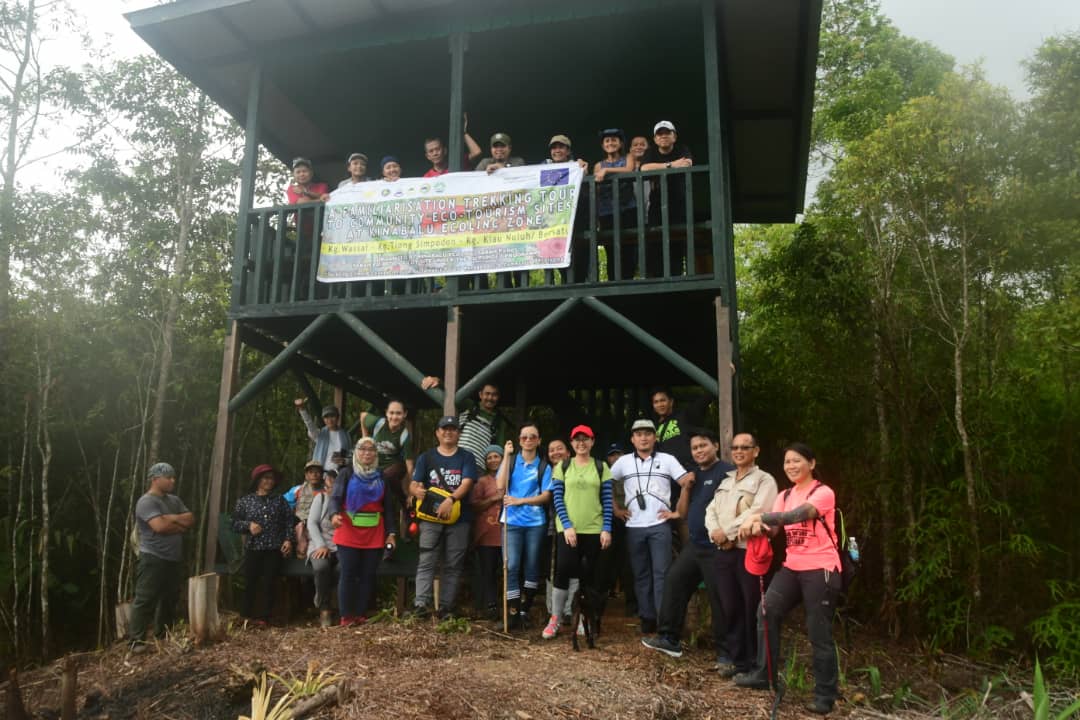
Observation tower built along the trek as part of the Ecolinc Zone eco-tourism programme.
KOTA KINABALU (Nov 26): Indigenous communities in the Kinabalu Ecolinc Zone in Kadamaian remain hopeful that their homestay service would breathe back to life now that the country has entered into an endemic stage of Covid-19.
Homestay service to them has become increasingly important to support their growing agro-tourism industry, which in turn provides sustainable sources of income to their families.
When the pandemic first hit about two years ago, they saw a long dark tunnel with no end in sight except to hope that the situation would return to normal. But as the number of cases kept increasing plus the long lockdowns, they just could not help feeling defeated.
“Thankfully, there have been encouraging signs that things are slowly returning to normal,” says Andy Martin bin Ginal.
“The communities want nothing more than to see their homestays get filled up again by visitors.”
Andy is the project manager for Ecolinc under the Sabah-EU REDD+ project who has been working closely with the communities in the zone.
REDD+ is an international framework that stands for “Reducing Emissions from Deforestation and forest Degradation, conservation of existing forest carbon stocks, sustainable forest management and enhancement of forest carbon stocks”.
The project started in 2013 and is set to end on November 30 this year.
The REDD+ Project is part of the EU’s programme titled “Tackling Climate Change through Sustainable Forest Management and Community Development”.
During the eight-year term, the project team worked with communities living adjacent to forest reserves in three areas: four villages in Kinabatangan River Corridor, ten villages in Kg Gana in Kota Marudu, and seven villages within the Kinabalu Ecolinc Zone.
The project supported the development of sustainable alternative livelihood activities for the communities, one of which is sustainable farming.
In the Kinabalu Ecolinc Zone, the team helped build the capacity of the communities on homestay management and marketing procedures to support their agro-tourism industry.
According to Martin, their eco-tourism products and services are highly attractive, especially the jungle trails they offer.
“In fact, each village has its own unique attraction. To give an added value to what Mother Nature has blessed them with, we helped them develop facilities such as an information centre, observation towers and rest huts,” he says.
Before the pandemic hit, he recalls that many visitors from various countries had stayed in their homestay and enjoyed the breathtaking forest view of the surrounding montane areas during jungle treks.
“The number of arrivals actually exceeded their target. But then, the pandemic hit and everything went downhill from there,” says Martin.
The project had also helped the communities restore huge acreage of degraded forest area rehabilitated with hundreds of thousands of trees planted.
Interestingly, they were also supported in an aquaculture venture on higher ground hundreds of metres above sea level.
“With some seeds grant money, the selected participants started the venture and managed to breed about 400 to 500 fish. Obviously, it wasn’t impressive until the REDD+ Project intervened. Now, I think they have around 13,000.
“This was achieved mainly because the project connected them with experts in University Malaysia Sabah. Thereafter, they became more knowledgeable, efficient and productive,” he says, adding that now they have managed to reap some profits from this venture.
“More importantly, they can sustain it as they can replenish their fish supply.”
Aside from this exciting agro-tourism product, pineapples are in abundance within the area, and many families are planting them to supplement their income.
In view of this, the project has come to help take them one step higher by going into processing. According to Martin, a processing centre to turn pineapples into jams, chips and so on is expected to complete by the end of November.
Once fully operational, he says, it would help provide a downstream added value for their pineapples in the market.

Zita
Meanwhile, a community member from Kg Wasai, Zita Kating, acknowledged the positive impact the Sabah-EU REDD+ Project has had on the lives of rural communities throughout the eight years.
While she gladly detailed out a long list of life-changing activities she knew of under the project, one thing that she said summarized the whole purpose and direction of it.
“To me, the REDD+ Project has helped me to understand and appreciate conservation better. As a person who has lived here all my life, I see the forest every day. The same goes with other fellow villagers. But we tend to take it for granted. Until we realise that if we don’t take care of it, the forest will be gone in 20 years or less.
“In a way, the project has helped me reconnect with the forest more meaningfully and sustainably,” she says.
